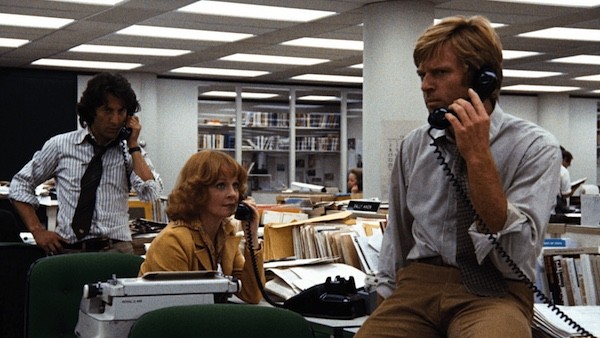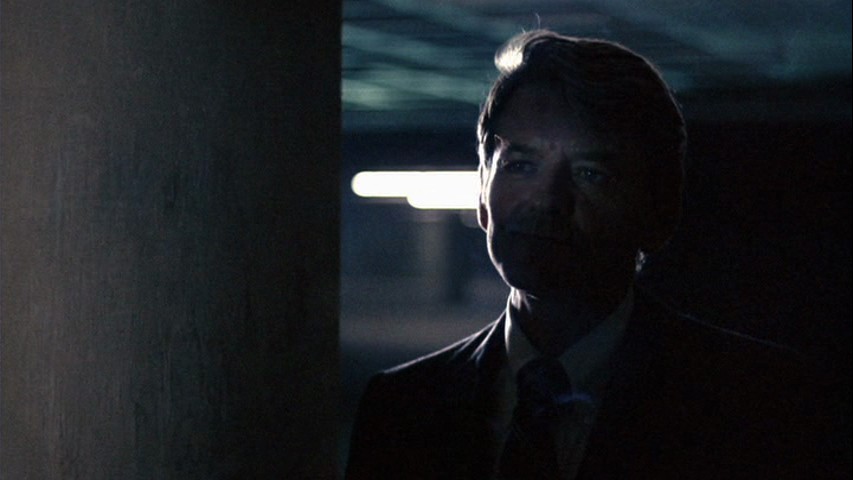Today, as neofascist candidate Donald Trump prepares to accept the Republican nomination, I’m beginning a new series on the Film/TV/Etc blog. Politics And The Movies will run approximately weekly until the election on November 8. I’ll be examining films whose subject or themes are explicitly political in an effort to relate them to the moment where we now find ourselves.

Dustin Hoffman, Penny Fuller, and Robert Redford in All The President’s Men
All The President’s Men was released in the election year of 1976, when Republican Gerald Ford, the only American president to ascend to the office having never received a single vote for either it or the vice presidency, faced Democratic challenger Jimmy Carter, a Naval nuclear engineer from Georgia. Ford took office upon the resignation of Richard Nixon in the wake of the Watergate affair, which was uncovered by the reporting of Carl Bernstien and Bob Woodward. One of director Alan J. Pakula’s best touches is the way he uses the constant drum of TV news reports of the 1972 presidential election as a counterpoint to increasingly paranoid plots taking place inside the newsroom of the Washington Post. Although the media environment of the mid-70s seems completely tame compared to the ravages of the 24 hour news cycle, the jarring tonal differences between the upbeat but sober reporting of Walter Cronkite and Bob Woodward (Robert Redford) and Carl Bernstein (Dustin Hoffman)’s journalistic cloak and dagger shenanigans struck a chord with the filmgoing audience. Not only was it nominated for eight Academy Awards and won four, but it also made an impressive $70 million on an $8 million budget.
All The President’ Men is a story about the inevitable intertwining of politics and media.Watching it today, the first thing that jumps out at you is the complete lack of computers on the desks of the Post newsroom. Our heroes spend much of the film on the phone, including an incredible extended take where Woodward wakes up a White House official in the middle of the night and tricks him into incriminating himself. Redford’s words are controlled and flat, but his body language and subtle facial expressions steadily ramps up the tension. Hoffman is similarly superb, rendering Bernstein as a neurotic ball of energy held together with nicotine and coffee.
The film leans heavily on its ripped from the headlines context. Nixon had only resigned eighteen months before, so events that Pakula and screenwriter William Goldman mention in passing carried much more weight in 1976 than they do 40 years later. But the movie left indelible impressions on film history. The X-Files ripped off its scenes with mysterious informant Deep Throat wholesale, with Mulder frequently meeting his exposition partner Mr. X in shadowed car garages. 2015’s Best Picture winner Spotlight is practically a remake, substituting rapist priests for crooked politicos.

Hal Holbrook as Deep Throat.
But I think the greatest contribution to political discourse is it introduction of the term “ratfucker”. Bernstein tracks down Donald Segretti, played by Robert Walden, who was the head of dirty tricks for the Committee to Re-Elect the President (CREEP). Over coffee and cigs, Segretti admits that any underhanded tactic was in play against the hated Democrats, but defends himself by saying that he and his colleagues only did things with “a little wit”.
Politics And The Movies 1: All The President’s Men
The ratfuckers got fatally caught in the Watergate scandal, but the culture of dirty tricks and demonizing the opposition thrived in the Republican party for decades. From the October Surprise to the Brooks Brothers Riot to Dan Rather’s forged poison pill, ratfucking has been at the heart of right wing electoral success for the last half century. We take it for granted now, but All The President’s Men shows that the amoral, win-at-all-costs philosophy that brought us candidate Donald Trump was once so shocking that it cost a president his job. The film’s commentary on the power of the press to create and destroy leaders rings just as true today is it did in 1976, but its faith in the basic decency of the Fourth Estate and the Americans who follow it seems like a rosy anachronism.